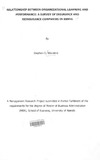| dc.description.abstract | Today’s world has more than ample evidence of unprecedented changes in the environment that have lent a new sense of urgency to business of the need to incorporate learning in the very cusp of company strategy in order to survive and prosper. Organizational learning is thought to provide a self-perpetuating competitive edge to organizations in an ever changing environment. However, success stories about the effect of organizational learning on organizational performance border on rare. Moreover published work in Kenya is too sparse to inspire confidence about the relationship between organizational learning and performance. The Kenya insurance industry comprising insurance and reinsurance companies has been facing challenges of over-capacity, price undercutting and uneconomical returns to shareholders. The industry is also witnessing coalescence of financial services and the formation of strategic alliances between financial institutions so as to leverage performance. In this competitive context the research question was posed as to whether there is a relationship between organizational learning and performance. The research objective was to determine the said relationship. A descriptive survey was used to compare data collected from a census study target population of 45 insurance and reinsurance companies. The type of data was opinions, specifically Chief Executive Officer (CEO) assessments of their own companies organizational learning and performance. The data was gathered by a self-administered questionnaire. Data analysis was by means of descriptive and inferential statistics, factor analysis and Pearson’s product moment correlation. The study realized a return of 37 companies representing a response rate of 82.2%. The study showed that insurance and reinsurance companies in Kenya greatly depend on chief executives to take responsibility for driving change through organizational learning. Chief executives make their companies embrace and entrench organizational learning,
x
cultivate a culture that provides psychological safety for staff to freely discuss and exchange ideas and thereby enhance financial performance. The CEO is first to acknowledge his or her own potential to err and listens to alternative views from junior staff. Chief executives also use their power to coercively persuade their staff to learn. The learning process is clearly initiated from the office of the CEO before embedding at lower levels. The study shows that the pedagogy that yields financial performance is rooted in learning by doing. Hierarchies are not strictly adhered to and employee autonomy is granted in pursuit of successful organizational learning. The results of the study show unequivocally that organizational financial performance is leveraged by organizational learning. Limitations of the study included the fact that a large percentage of the respondents had been with the organization for up to five years making it challenging to accurately and objectively assess the learning experiences of their organizations. Some organizations had been in existence for a relatively short time with the result that their | en |

